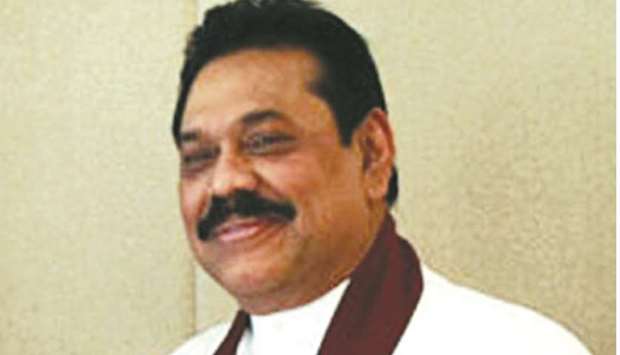The party of former Sri Lankan president Mahinda Rajapakse called on the ruling coalition government to step down yesterday, as it closed in on a comfortable
victory in local elections.
With 316 of 340 council results officially declared by yesterday afternoon, Rajapakse’s Sri Lanka Podujana Party (People’s Party) was clearly ahead, winning 225 of them.
Rajapakse’s party had obtained 45.38% of votes counted so far, posing a major setback to the two combined ruling parties – one of them led by President Maithripala Sirisena and the other by Prime Minister Ranil Wickremesinghe.
The winning party’s members have called on the government to resign after its defeat in the crucial local polls, though they have no direct link with the presidential and parliamentary polls in which Sirisena and Wickremesinghe were elected in 2015.
“The mandate given to the government has now been cancelled and therefore the government should resign,” said Dinesh Gunawardena, a member of parliament supporting Rajapakse’s party.
Sirisena’s United People’s Freedom Alliance (UPFA) was trailing far behind, with only 14.98% of the vote, while Wickremesinghe’s United National Party (UNP) secured 32.23% of results so far.
Unofficial results indicated that Rajapakse’s party was expected to capture more than 240 local councils.
Sirisena, who met with his senior ministers to analyse the results, also held a meeting with Wickremesinghe.
“The president, who met with us, has said he would be making drastic changes in the next few days but did not give the details,” said cabinet minister S B Dissanayake, who had attended the meeting.
The release of results has been slower than in previous elections due to a complicated verification system that was being used under a new electoral system.
The polls to elect village and town council representatives closed with one of the lowest incident rates in four decades, after more than 70% of the nation’s 15.7mn registered voters took part.
Rajapakse returned to parliament as an ordinary member in 2015 after he was defeated in presidential elections.
Since then, he has been trying to make a comeback by winning power in the central
government.
Rajapakse formed a new political party and fielded candidates throughout the country after failing to win the leadership of his original party – the UPFA.
Sirisena took over the leadership of the UPFA instead, and a section of his party members, along with the UNP, have control in the 225-seat parliament. Together they have more 150 members of parliament,
or a two-thirds majority.
Together the parties have passed important legislation, including a right-to-information law, changes to the electoral system to reduce rivalry among candidates, and a law making it compulsory that 25% of those elected to local
councils are women.
“We should celebrate the victory in a peaceful manner without causing harm to others,” Rajapakse told local media as results were being announced.
Rajapakse has been largely campaigning on his achievement of ending the 26-year Sri Lankan civil war by militarily defeating the Tamil rebels of the Liberation Tigers of Tamil Eelam in 2009.
In the Northern Province, a moderate Tamil political party that has been closely working with the central government won most councils.
Presidential and parliamentary elections are due in two years.

Mahinda Rajapakse ... comfortable victory
